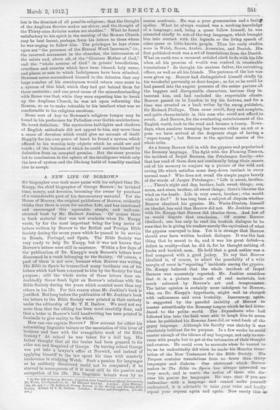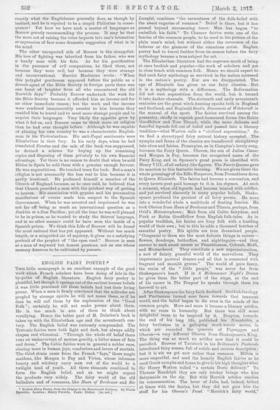A NEW LIFE OF BORROW.*
No biographer ever took more pains with hie subject than Dr. Knapp, the chief biographer of George Borrow ; he lavished time, money, and devotion, becoming the owner by purchase of a considerable part of his documentary material. Yet the House of Murray, the original publishers of Borrow, evidently thinks that there is room for another Life, and has sanctioned and encouraged this agreeable, simple, and well-eon. etruoted book by Mr. Herbert Jenkins. Of course there is fresh material that was not available when Dr. Knapp wrote, by far the most important being the long series of letters written by Borrow to the British and Foreign Bible Society during the seven years which he passed in its service in Russia, Portugal, and Spain. The Bible Society was very ready to help Dr. Knapp, but it was not known that Borrow's letters were still in existence. Within a few days of the publication of Dr. Knapp's work Borrow's letters were discovered in a vault belonging to the Society. Of course, a part of them Is not new, because when Borrow was writing The Bible in Spain he transcribed many incidents out of his letters which bad been returned to him by the Society for that purpose ; still the whole series of these letters does un- doubtedly throw fresh light on Borrow's relations with the Bible Society during the years which counted more than any others in his life. For this reason alone Mr. Jenkins'e book is justified. Not long before the publication of Mr. Jenkins's book
the letters to the Bible Society were printed in their entirety under the editorship of Mr. T. H. Darlow. We need not say more than that the editing has been most carefully done, and that a letter in Borrow's bold handwriting has been printed in facsimile to give reality to the whole.
How can one explain Borrow ? How account for either his astonishing linguistic talents or the association of this lover of bruisers and beer with the evangelistic work of the Bible Society ? At school he was taken for a dull boy. His father thought that all the brains had been granted to his elder sou and despaired of George. On leaving school George was pub into a lawyer's office at Norwich, and instead of applying himself to the law spent his time with masterly irrelevance in studying Welsh. Such a passion for languages as he suddenly discovered could not be conquered; if he starved in consequence of it it must still be the passion and occupation of his life. His linguistic talents were by no
*(r) The IAA of George Borrow: Compirsd from Unpublished. Official Documents, His Works, Correspondence, B.c. By lierbort Jenkins. London: John Murray. 10s. ed. not.1—(2) Lstters of George Borrow to the Dritieh and Foreign Bible Sooieig. Edited by T. II, Darlow. Loudon t Hodder and.Stoughten. re. ea, net.] means academic. He was a poor grammarian and a faults speller. What he always wanted was a working knowledge of a language ; and, being a queer fellow himself, he was attracted chiefly to out-of-the-way languages, which brought him into contact with the legends or the living, speech of other queer or little-known people. Thus his early studies. were in Welsh, Saxon, Arabic, Armenian, and Danish.. His first published work IMS a set of translations from the Danish. What on earth was a recusant articled clerk to do with his life when all his promise of wealth was centred in unsaleable translations ? So thought his anxious father, the recruiting officer, as well as all his friends. The pretence of the law was soon given up. Borrow had distinguished himself chiefly by his wonderful perversity as door-keeper ; so far as he could he had passed into the august presence of the senior partner all the beggars and disreputable characters, because they in- terested him, and had excluded the respectable clients. Borrow passed on to London to try his fortune, and for a time was sweated as a hack writer by the smug publisher, Sir Richard Philippe. Then came revolt, fiery and complete, and quite characteristic in this man who could not afford to revolt. And Borrow, for the everlasting entertainment of the English world, took to the road and became a, tramp. Nowa- days, when amateur tramping has become either an art or a pose we have arrived at the desperate stage of having a " super-tramp "; but Borrow is the spiritual master of the whole tribe.
As a tramp Borrow fell in with the gypsies and popularized the Romany language. The fight with the Flaming Tinmen, the incident of Isopel Berners, the Petulengro family—who that has read of them does not continually bring their names out of his memory to conjure up a picture of the wild and roving life which satisfies some deep-down instinct in every normal man ? Who does not recall the simple pagan beauty of the words of Jasper Petulengro: "Life is sweet, brother. . • • There's night and day, brother, both sweet things; sun, moon, and stars, brother, all sweet things ; there's likewise the wind on the heath. Life is very sweet, brother ; who would wish to die?" It has long been a subject of dispute whether Borrow idealized his gypsies. Mr. Watts-Dunton, himself an idealist, has said that Borrow did not. Mr. Jenkins agrees with Dr. Knapp that Borrow did idealize them. And few of us would dispute that conclusion. Of course Borrow idealized; one has only to read his bookish dialogue to be sure that he is giving his readers merely the equivalent of what the gypsies conveyed to him. Yet it is strange that Borrow should ever have written bookish dialogue. It was the last thing that he meant to do, and it was his great defect—a defect in reality—that he did it, for he thought nothing of books and bookish men. He held that a good author was a fool compared with a good jockey. To say that Borrow idealized is, of course, to admit the possibility of a wide margin of error in "reporting" incidents among the gypsies.
Dr. Knapp believed that the whole incident, of Ieopel
Berners was accurately reported. Mr. Jenkins considers that it is a picture made out of real materials, but much coloured by Borrow's art and temperament.
The latter opinion is certainly more indulgent to Borrow, who, on Dr. Knapp's hypothesis, might well be charged: with callousness and even brutality. Inaccuracy, again,
is suggested by the parallel inability of Borrow to master scientifically the Romany tongue which he ha d intro-
duced to the polite world. The Dryasdusts who had
followed him into the field were able to laugh him to Boom when he published his Romano Lavo-Lil, or word-book of the
gypsy language. Although his faculty was sketchy it was absolutely brilliant for its purpose. In a few weeks Ile could master enough of the idioms of any language, not only to con- verse with people, but to get at the intimacies of their thought and custom. He could even be accurate when he wanted to be, as he undoubtedly did when he made- his Mendel trans- lation of the New Testament for the Bible Society. His Tangent contains translations from no fewer than thirty
languages and dialects. One statement which, Borrow makes in The Bible in Spain has always interested us vety much, and is worth- the notice of those who dis- cuss his genius for languages. He says that it you are unfamiliar with a language and cannot make yourself understood, it is advisable to raise your voice and loudly! repeat your request again and again. Now surely this hit exactly what the Englishman generally does, as though by instinct, and he is reputed to be a stupid Philistine in conse- quence I Yet here we have such a master of languages as Borrow gravely recommending the process. It may be that the mere act of raising the voice imports into one's intonation or expression of face some dramatic suggestion of what is in the mind.
The other • unexpected side of Borrow is the evangelist. His love of fighting was inherited from his father, who was is bandy man with his fists. As for his gratification in the presence of evil companions, he liked them, not because they were evil, but because they were strange and unconventional. Harriet Martineau wrote : "When this polyglot gentleman appeared before the public as a devout agent of the Bible Society in foreign parts there was one burst of laughter from all who remembered the old Norwich days." Probably Borrow undertook the work for the Bible Society because it afforded him an income and for no other immediate reason ; but the work and the income were rendered immeasurably sweeter to him because they enabled him to travel and to meet more strange people and to acquire their languages. Very likely the appetite grew by what it fed on, and Borrow came to think more on religion than lie had ever thought before. Although lie was capable of abusing his own country he was a characteristic English- man in his Protestantism. His anti-Papal sentiments were Elizabethan in their fury. In his early days, when he had translated Faustus and the sale of the book was suppressed, he devised a scheme for buying up the remaining copies and disposing of them privately to his own financial advantage. Yet there is no reason to doubt that when he sold Bibles in Spain be sold,them with a genuine enough fervour. He was superstitious. He touched trees for luck. But a man's religion is not necessarily the less real to him because it is partly irrational. He professed himself a member of the Church of England because, as be once said, he believed that that Church provided a man with the quickest way of getting to heaven. His association with gypsies and his provocative manifestoes of course made him suspect to the Spanish Government, When he was arrested and imprisoned be was not far off being as much an international question as a Jenkins or a Don Pacifico ; yet all the time he was well pleased to be in prison, as he wanted to study the thieves' language, and in no other manner could he have seen the inside Of a Spanish prison. We think this Life of Borrow will be found the most rational that has yet appeared. Without too much length, or a misguided air of mystery, it gives us a satisfying portrait of the prophet of "the open road." Borrow is seen as a man of wayward but honest passions, not as one whose memory deserves to be cultivated by poseurs.











































 Previous page
Previous page